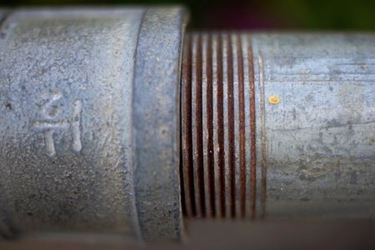How Cities Leverage Machine Learning To Expedite Lead Service Line Removal
By Nya Dreyfuss

An interview with Kristin Epstein, PE, Assistant Director of Department of Water and Sewer (Trenton Water Works), City of Trenton, New Jersey.
Why has Trenton Water Works launched a system-wide effort to completely remove and replace lead service lines?
Investing in Trenton’s water infrastructure has been a priority for Mayor Gusciora since he took office in 2018. We’ve taken a proactive approach to reducing lead exposure in drinking water by creating a program that subsidizes the cost of lead service line replacement for homeowners. By prioritizing the removal and replacement of lead service lines (LSLs), we are promoting the health and wellbeing of all of our customers, including citizens of the City of Trenton and the Townships of Hopewell, Ewing, Lawrence, and Hamilton.
To date, Trenton Water Works (TWW) has removed 25 percent of the LSLs within its system and at private homes across its service area. Those lines have been replaced with copper pipes. TWW is targeting to remove an additional 1,200 LSLs this year as a part of our commitment to maintaining water quality and remaining compliant with federal and state lead and copper rule requirements. TWW is proud of its progress to date and is committed to replacing all LSLs by 2031.
How has Trenton Water Works structured its lead service line replacement program?
We want to minimize the cost of LSL replacement for TWW customers, which is why we’ve structured a program that caps the cost to homeowners at $1,000. The replacement cost is charged in the form of a special tax assessment on the homeowners’ property, payable at $50 per quarter for five years, with no interest fees. Each township served by the TWW distribution system has also adopted an ordinance allowing the City of Trenton to serve as the collector for this fee.
Our program is financed by state grants and loans with forgivable principal from the New Jersey Infrastructure Bank (I-Bank). To date, the program has received $50 million from these two sources, $21.5 million of which will be forgiven.
Why did Trenton Water Works want to partner with BlueConduit?
After sending letters to homeowners with known LSLs inviting them to sign up for the $1,000 replacement program, we launched the construction phase of the removal program in February 2020. We are working to complete the replacements for all homeowners who have already pre-registered for the program. While this volunteer approach has allowed us to remove over 8,000 LSLs, there are still barriers to attracting participants in the form of cost, logistics, and engagement. We want to ensure that we remove the remaining estimated 24,000 LSLs as efficiently, cost-effectively, and equitably as possible, which is why we’ve partnered with BlueConduit.
With the New Jersey Governor’s new mandate of replacing 100 percent of existing LSLs in the next 10 years, we plan to move toward a mandatory replacement program at no additional cost to customers and, in the process, reduce overall construction costs by 15 percent, similar to what was achieved in the City of Newark. BlueConduit’s partnership and machine learning software are key to our roll out of this mandatory replacement program.
BlueConduit is helping us determine the actual scale of LSLs remaining in our distribution system so that we can accurately plan our capital outlay, successfully secure grant funds, and effectively pace our replacement work. This data-driven approach will save TWW valuable time and money and ensure we are prioritizing the needs of citizens who are at the highest risk of lead exposure.
What has the city learned throughout the planning and implementation process, and are there things about the program you’ve changed as a result?
TWW updated its LSL inventory many times prior to and after launching our first removal efforts in February 2020. Our partnership with BlueConduit has helped us better understand and harness the predictive power of this data.
BlueConduit used our initial LSL inventory data to make predictions about currently unknown service line material. As a part of this process, TWW conducted LSL inspections at a representative set of homes across our service area. As we complete in-home and curb box inspections, we are reporting our results back to BlueConduit so that this new data can be incorporated into the data model and further improve the accuracy of its predictions. The home-by-home predictions provided by BlueConduit will be used in the future phases of the TWW program to ensure equitable replacements.
We’ve learned that the use of machine learning can help us better target our replacement efforts, which makes our process for identifying and removing LSLs faster, less invasive, less costly, and more accurate.
How have TWW’s customers responded to the city’s lead service line replacement program?
While there is positive feedback and expressions of gratitude for ongoing infrastructure improvements, the disruption that the construction process causes and the rate at which construction is being completed can cause some customer frustration. BlueConduit’s machine learning software will help TWW address these ongoing pain points by making information about the location of LSLs and how LSL replacement efforts are progressing readily available to customers.
The LSL location maps produced by BlueConduit are not only a critical tool for building community engagement and trust, they are also an integral part of our efforts to coordinate LSL removal with other planned city infrastructure projects. For example, TWW is using BlueConduit’s LSL predictions to prioritize LSL removal in areas where road paving is being planned as a way to minimize the distribution caused by construction and save valuable time and money. We’ve used BlueConduit’s predictive data to launch a letter campaign targeting homeowners in these neighborhoods so that we can educate them about LSLs and invite them to participate in our replacement program.
About Kristin Epstein
 Kristin Epstein leads the Lead Service Line Replacement Program for Trenton Water Works, serving Trenton, Ewing, and areas of Lawrence, Hamilton, and Hopewell. In addition, she manages the Capital Projects Engineering Unit for the Department of Water and Sewer.
Kristin Epstein leads the Lead Service Line Replacement Program for Trenton Water Works, serving Trenton, Ewing, and areas of Lawrence, Hamilton, and Hopewell. In addition, she manages the Capital Projects Engineering Unit for the Department of Water and Sewer.
Prior to joining the City of Trenton, Kristin was a non-profit Executive Director and project engineer with several engineering consulting firms in New Jersey and Maryland. She primarily focused on environmental compliance, hazardous waste, wastewater, solid waste, and air permitting for a variety of manufacturing and municipal clients throughout the East Coast. Kristin received a bachelor’s degree in Civil & Environmental Engineering from Princeton University and a master’s degree in Science & Engineering from the Department of Geography and Environmental Engineering at Johns Hopkins University.
About Nya Dreyfuss
 Nya Dreyfuss is the Vice President of Customer Success at BlueConduit and the key liaison between BlueConduit and its clients. She focuses on helping BlueConduit’s customers navigate their lead service line replacement initiatives by presenting effective solutions that support their project needs.
Nya Dreyfuss is the Vice President of Customer Success at BlueConduit and the key liaison between BlueConduit and its clients. She focuses on helping BlueConduit’s customers navigate their lead service line replacement initiatives by presenting effective solutions that support their project needs.
A graduate of Youngstown State University with a B.S. in Biology and Chemistry, Nya has over 10 years of environmental compliance and regulatory expertise within water and wastewater public utilities and the coal and gas energy sector. She most recently served as the Lead Program Manager for a large Midwestern public utility and brings extensive knowledge about state and federal lead and copper regulations to her work with BlueConduit’s clients. She has a passion for clean water and compliant infrastructure and is eager to help all communities maintain healthy, safe drinking water.
